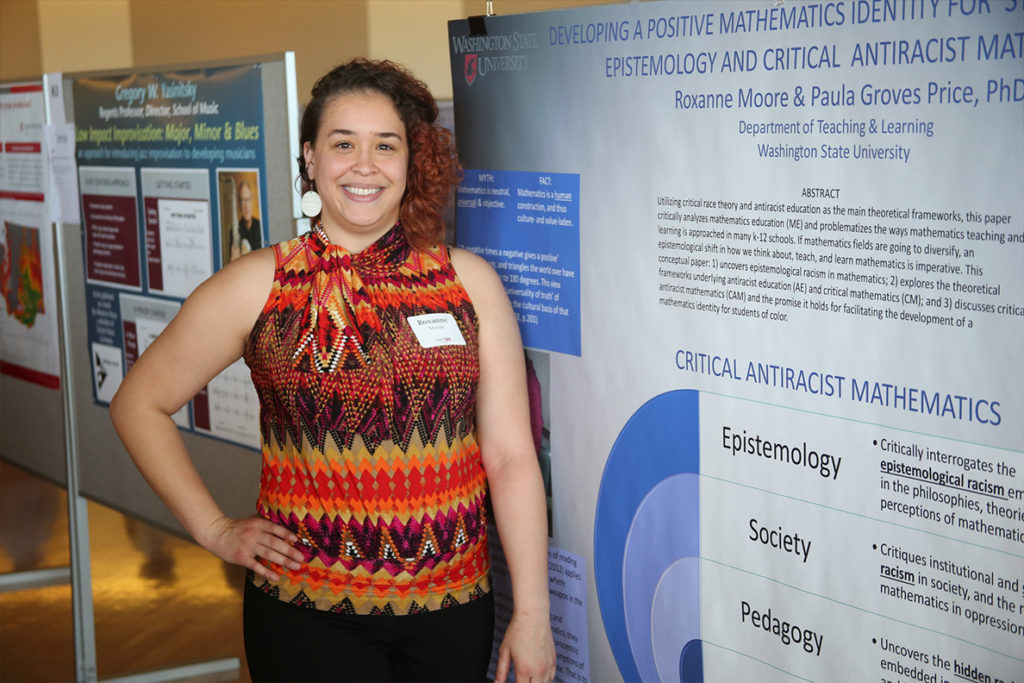A doctoral student in Washington State University’s College of Education has received a $15,000 Scholar Award from the International Chapter of the P.E.O. Sisterhood.
Roxanne Moore, who is earning her Ph.D. in mathematics and science education, was sponsored by Pullman’s P.E.O. chapter.
The P.E.O. acronym stands for “philanthropic educational organization” and was set up in 1869 as a women-helping-women organization.
Sue Schell, who leads Pullman’s chapter, said she was immediately impressed with Moore, and not just because Moore was trying to further her own education.
“She has also been dedicated to helping preservice teachers at the university learn to be better math teachers, as well as make math itself less stressful for the rest of us who are not, or were not, math majors.”
Like a match meant to be, it’s not just Schell who was impressed with Moore, but also the other way around.
“They have been tremendously supportive by checking in on me through email and text, and Sue Schell and I even got to meet up for lunch in San Diego when I was there for a conference and she was traveling with her family,” Moore said. “Several of the sisters are retired teachers so we connect around feeling deeply passionate about our service to children, families, and the world.”
The one-time scholar award was established in 1991 specifically to provide merit-based support for women in the U.S. and Canada who are pursuing a doctoral-level degree.
Schell said more than 900 women applied for the scholar award, each sponsored by a P.E.O chapter, including 34 applicants from Washington state. As a celebration of the organization’s sesquicentennial, 150 of the $15,000 awards were given.
While the money was a nice bonus, it was the purpose of service and education that Moore said drew her to the scholarship.
“I was particularly struck by the statement of a P.E.O. sister explaining that ‘by investing in education we are investing in the future of humanity,’ and that the impact in investing in women goes far beyond the individual, reaching their family, community, society, and through multiple generations,” she said.
That was important to Moore because she said that for a field typically perceived as being concerned with accuracy and attention to precision, she has always found the lack of accuracy and attention to teaching about the mathematical contributions of women and people of color to be curious.
“Obviously there are sociocultural, political and economic motivations for the erasure of contributions made by women and people of color; this is true across all fields,” Moore said. “Recognizing the substantial contributions of women and people of color in mathematics is about intellectual honesty and dismantling one of the most common misconceptions about mathematics: that it is by and for ‘old white men with beards.”
Moore is quite clear: mathematics is by and for everyone.
“It always has been. It is a human construction, created over spaces and times, influenced by the sociocultural, political and economic contexts,” she said. “It is rooted in real-world challenges and has real-world, material consequences for people. This is the humanity of mathematics. This is the soul of mathematics. We must teach this to our students and pre-service teachers.”
Schell said that the passion Moore had was evident. She expects the scholarship will help Moore use that passion for good.
“My hope for Roxanne is that she can do just what she set out to do, including helping people see math as a less stressful experience,” Schell said. “I hope others can also be more aware of the many contributions women have made to the advancement of mathematics.”
Find out more about P.E.O.






